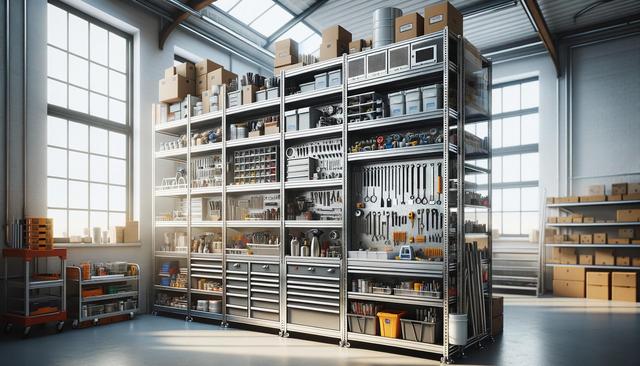Optimizing Limited Space in Small Business Settings
Small businesses in Kenya often operate in compact environments where floor space comes at a premium. Whether it’s a backroom of a retail store, a small-scale warehouse, or an office storeroom, making the most of vertical and horizontal space is key. Industrial shelving provides a practical solution by enabling businesses to store more items efficiently without compromising accessibility. These systems are designed to hold heavy loads, support varying inventory sizes, and adapt to changing storage needs as businesses grow.
For example, adjustable steel shelving units are becoming a common sight in Nairobi’s retail and logistics sectors. They allow users to customize shelf heights, accommodate items of different sizes, and easily reorganize layouts. This flexibility is especially useful for growing enterprises that frequently update their inventory or scale their operations. By streamlining storage, these shelving systems contribute to smoother workflows and better space utilization, which are essential in a competitive business environment.
Material Choices and Durability Considerations
Choosing the right material for industrial shelving is crucial for long-term use and safety. Kenyan small business owners are increasingly opting for materials that combine strength with resilience to local environmental conditions. Galvanized steel, for instance, offers excellent resistance to corrosion and is suitable for humid or dusty environments such as coastal towns or warehouse interiors. Powder-coated finishes also offer an extra layer of protection and aesthetic appeal, making them popular for office storage rooms.
Durability is not just about the lifespan of the shelving unit but also about ensuring it can safely bear the weight of stored items. When selecting shelving, business owners should consider:
- The maximum load per shelf and total unit capacity
- Stability features such as anchoring options
- Ease of assembly and maintenance
Investing in high-quality materials may involve a higher upfront cost, but the long-term benefits often outweigh the initial expense. Reliable shelving reduces the risk of accidents, prevents product damage, and supports efficient operations.
Applications Across Different Business Types
Industrial shelving is not limited to warehouses. Small businesses across various sectors in Kenya are leveraging these solutions to enhance their operations. In retail, heavy-duty shelves are used for backroom storage of products, seasonal inventory, and packaging materials. In automotive workshops, robust racking systems are used to store parts, tools, and lubricants. Offices utilize modular shelving for document archiving, office supplies, and IT equipment.
Common applications include:
- Retail: stock organization and inventory rotation
- Workshops: tool storage and spare part management
- Offices: file storage and equipment safekeeping
- Pharmacies: categorized shelving for medications
- Food distribution: dry goods and packaging materials
Each industry has its own storage challenges, and the versatility of industrial shelving makes it a valuable addition to almost any business setting. Tailoring shelving systems to specific needs ensures efficiency and optimizes daily operations.
Cost-Effective Growth Through Scalable Storage Solutions
One of the key advantages of industrial shelving for small businesses is scalability. As companies expand, storage needs increase, and modular shelving systems can grow with the business. Units can often be extended vertically or horizontally, allowing for phased investments instead of large upfront expenditures. This aspect is particularly beneficial in Kenya’s dynamic small business landscape, where firms must adapt quickly to market changes and opportunities.
Scalability also supports seasonal business models. For example, retailers may require additional storage during holiday seasons or promotional campaigns. Having expandable shelving in place makes it easier to manage surges in inventory without resorting to offsite storage or costly renovations. Moreover, reconfigurable shelves mean businesses can repurpose the same storage units for different needs over time, enhancing cost-efficiency.
To maximize the benefits of scalable storage, business owners should consider working with local suppliers who understand the specific constraints and requirements of the Kenyan market. These suppliers can recommend shelving systems that are both space-efficient and budget-friendly, while also offering after-sales support and installation services.
Improving Operational Efficiency and Safety
Effective storage goes beyond organization—it directly impacts operational efficiency and workplace safety. In a small business environment, cluttered spaces can lead to inventory mismanagement, delayed order processing, and increased risk of injuries. Industrial shelving helps address these issues by creating clear, designated spaces for different categories of items. This structured storage approach reduces time spent searching for products and streamlines daily tasks.
Moreover, by elevating items off the floor and securing heavier loads on lower shelves, shelving systems help maintain a safe and ergonomic workspace. Safety is further enhanced by incorporating features such as anti-tip brackets, load indicators, and shelf dividers. These features not only prevent accidents but also extend the life of the shelving unit.
For small businesses aiming to improve their internal logistics, adopting shelving systems designed with operational flow in mind is essential. This includes locating frequently accessed items at reachable heights and grouping related products together. When implemented thoughtfully, industrial shelving becomes a silent partner in productivity—supporting staff, protecting assets, and contributing to smoother business operations.
Conclusion: Supporting Growth with Practical Storage Solutions
For small businesses in Kenya, especially those navigating rapid growth or space limitations, industrial shelving offers a practical path to improved efficiency, organization, and safety. From retail stores to offices and warehouses, these systems provide the flexibility and durability needed to support evolving operational demands. By choosing reliable materials, scalable designs, and industry-appropriate configurations, Kenyan entrepreneurs can build storage infrastructures that grow alongside their businesses—helping them stay competitive in an ever-changing market.






